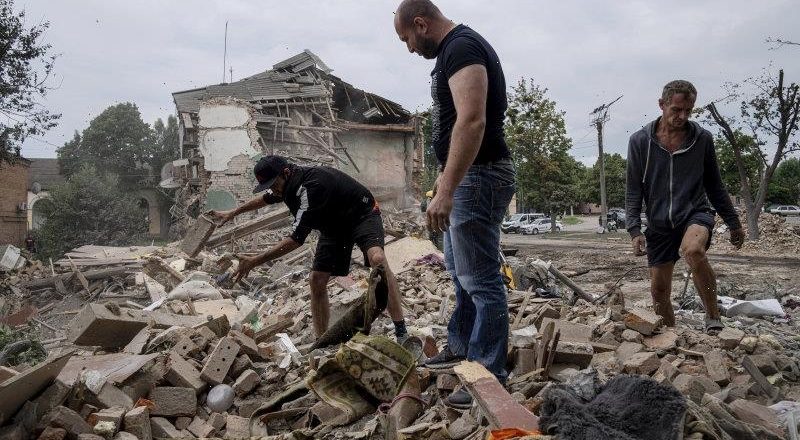Australia should take a leading role in ensuring war criminals face justice
In April, Ukrainian President Volodymyr Zelensky used a video address to the United Nations Security Council in New York to issue a blunt challenge.
“Do you think that the time of international law has passed?” he asked his audience. “If your answer is no, you need to act now, act immediately.”
The machinery of international law has never been known for operating swiftly, but as our correspondent Anthony Galloway and photojournalist Kate Geraghty have reported in their four-part investigation for The Age, there is a UN mission in Ukraine, headed by Australian Matilda Bogner, which is documenting cases of arbitrary detention, enforced disappearance, torture and extra-judicial killing as well as possible war crimes and crimes against humanity by invading Russian troops, and their Ukrainian opponents.
Ukrainian authorities have signalled their intention to pursue those accused of war crimes at a national level, launching what they called “The Book of Executioners” in June. Meanwhile, the International Criminal Court has deployed its largest ever team of detectives to the country to assist investigations.
Kyiv signed but has not ratified the Rome Statute that established the court, so the ICC’s team is operating there under special permission dating back to Russia’s seizure of Crimea in 2014. After the court declared Crimea to be occupied territory, Moscow decided to withdraw its signature.
What this means is that in a place like Bucha, which Zelensky singled out in his UN address and our reporters visited for their investigation, establishing that a crime took place is only part of the challenge. Who will be held responsible for such crimes? And how?
In his testimony to this masthead, former detainee Boris Popov remembers a man he calls “that butcher” who he believes was the commander of a Russian unit operating near Bucha because men followed his orders when maiming prisoners. But what if this man cannot be identified or apprehended? What if his superiors say he acted on his own twisted initiative? As we have seen with the murder of Saudi journalist Jamal Khashoggi, regimes can distance themselves from crimes committed in their name through show trials that exonerate leaders, as long as the international community does not show determination to pursue the case.
For too long such determination has been lacking, particularly when it comes to major suppliers of fossil fuels such as Russia and Saudi Arabia. Zelensky noted that earlier mass killings in Syria and Yemen had gone unpunished, setting a grim precedent for the destruction wreaked on Ukraine by aerial bombardment.
Since both Beijing and Washington have refused to accept the International Criminal Court’s jurisdiction, their allies have drawn the conclusion that when it comes to war, international law is a dead letter. Even if the two great rivals could be convinced that Russian officers and officials should face an international tribunal, it could take years and even regime change in Moscow before Russian President Vladimir Putin and his ministers face the kind of reckoning that led to Bosnian Serb leaders Ratko Mladic and Radovan Karadzic and former Serbian president Slobodan Milosevic facing trial.
Earlier this year, Australia took legal action over the 2014 downing of Malaysia Airlines flight 17 over Ukraine. News that the European Union has reached out to Australia in a bid to collect evidence from refugees in this country, and to ensure assets cannot be moved here to avoid seizure, gives us another chance to take an active role in improving the system of international justice, one that might be expanded to include other conflicts and cases of human rights abuse globally.
“I am going to The Hague to find justice,” Ukrainian war widow Alyona Lapchuk said when we interviewed her in Kyiv. But what she and thousands of others who have been bereaved and traumatised by this war find when they get there depends on whether there is still an international community with the collective will to ensure such atrocities and their perpetrators are pursued and punished, however long it may take. Australia should help to lead the way.
Gay Alcorn sends a newsletter to subscribers each week. Sign up to receive her Note from the Editor.
Most Viewed in World
From our partners
Source: Read Full Article

